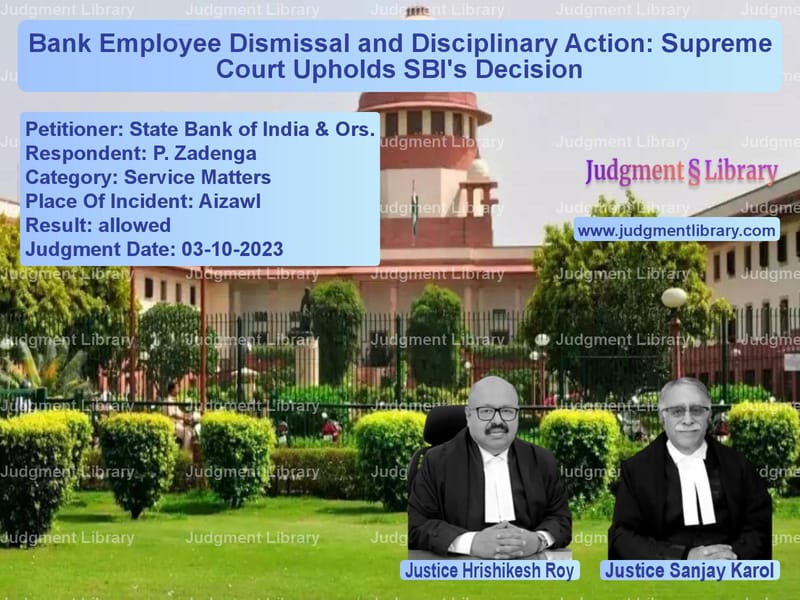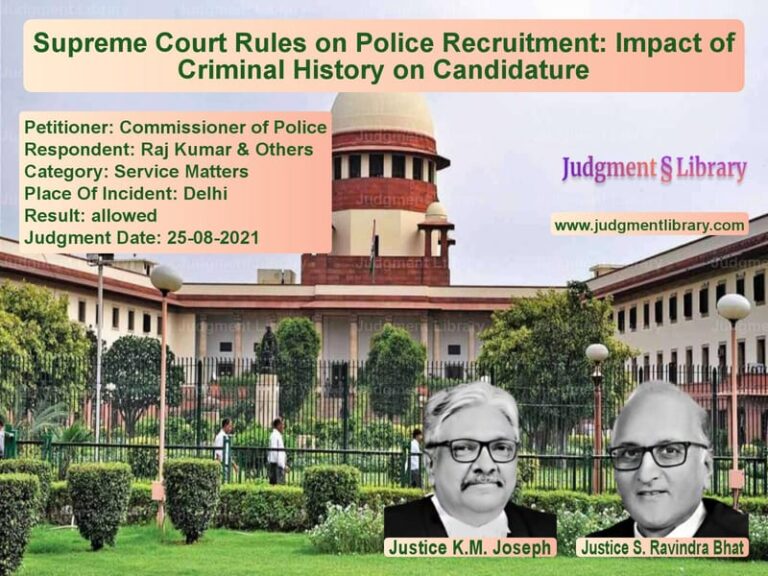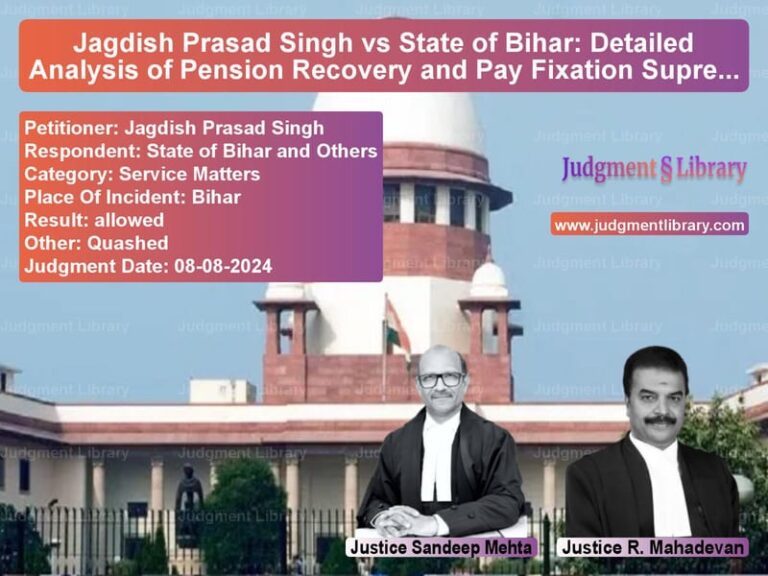Bank Employee Dismissal and Disciplinary Action: Supreme Court Upholds SBI’s Decision
The case of State Bank of India & Ors. v. P. Zadenga revolved around the dismissal of a bank employee due to allegations of financial misconduct and the subsequent legal battle over whether disciplinary proceedings should be stayed while a criminal case was pending. The Supreme Court’s ruling clarifies the relationship between departmental and criminal proceedings and establishes important principles regarding employer actions in cases of alleged misconduct.
Background of the Case
The respondent, P. Zadenga, was employed as an Assistant (CAT) at the Dawrpui Branch of the State Bank of India (SBI) in Aizawl. Complaints were lodged against him for allegedly receiving deposits from government retailers but failing to enter the amounts into the bank’s cash receipt records. It was also alleged that a retailer used a fake challan to obtain food supplies.
As a result, SBI initiated disciplinary proceedings against Zadenga and issued a Memorandum on 8th December 1999. The charges included:
- Failure to deposit Rs. 61,908 received on 19th April 1996.
- Two additional incidents on 21st February 1995 involving Rs. 24,640 and Rs. 27,412.
Simultaneously, three separate FIRs were registered against Zadenga, leading to his arrest, although he was later released on bail. He argued that since criminal cases were ongoing, the disciplinary proceedings should be stayed.
Despite his objections, SBI proceeded with an inquiry, and three out of four charges were found to be substantiated. As a result, he was dismissed from service on 28th March 2003. His departmental appeal was also rejected on 16th August 2004.
Legal Battle: Writ Petition and High Court Rulings
Aggrieved by his dismissal, Zadenga filed a writ petition before the Gauhati High Court in 2005. His primary argument was based on Clause 4 of the Memorandum of Settlement (MoS) dated 10th April 2002, which he claimed prohibited SBI from proceeding with disciplinary action while criminal proceedings were pending.
The High Court ruled in his favor, stating that:
- Clause 4 of the MoS required the bank to stay disciplinary proceedings until the conclusion of the criminal case.
- The proceedings initiated by SBI were in violation of the settlement and therefore invalid.
SBI appealed this decision, but the High Court’s Division Bench upheld the ruling, confirming that the disciplinary proceedings should have been stayed.
Supreme Court’s Ruling
The Supreme Court, after reviewing the case, overturned the High Court’s decision and ruled in favor of SBI. The key points of the judgment were:
- Clause 4 of the MoS does not create an absolute bar on disciplinary proceedings. The Supreme Court clarified that the provision allows disciplinary action if the employee is not put on trial within a year of the alleged misconduct.
- Stay of disciplinary proceedings is not automatic. While it may be advisable in some cases to stay departmental action during a criminal trial, this is not mandatory.
- Acquittal in a criminal case does not automatically lead to exoneration in disciplinary proceedings. The Court reiterated that departmental inquiries operate on different standards and objectives than criminal trials.
The Court emphasized its previous rulings, including State Bank of India v. Neelam Nag, which held that criminal trials and disciplinary proceedings are distinct and can proceed independently.
Judicial Precedents Considered
The Supreme Court referred to various judgments to support its decision:
- State of Rajasthan v. B.K. Meena: Established that disciplinary proceedings should not be routinely stayed due to pending criminal trials.
- M. Paul Anthony v. Bharat Gold Mines Ltd.: Affirmed that both proceedings can proceed simultaneously unless the charges are identical and involve complex legal issues.
- Karnataka Power Transmission Corp. Ltd. v. C. Nagaraju: Held that an acquittal in a criminal trial does not preclude disciplinary action.
- United Commercial Bank v. P.C. Kakkar: Stated that banks must uphold high standards of integrity and that acquittal in a criminal case does not impact a misconduct inquiry.
Final Decision
The Supreme Court concluded that:
- SBI was justified in initiating disciplinary proceedings and dismissing Zadenga.
- Clause 4 of the MoS does not prevent an employer from taking disciplinary action if criminal proceedings are delayed.
- The Gauhati High Court’s order was incorrect, and it was set aside.
Consequently, the Court reinstated Zadenga’s dismissal from service.
Implications of the Judgment
This ruling reinforces key principles in employment and labor law:
- Employers have the right to conduct disciplinary proceedings independently of criminal trials. Organizations can take action based on internal inquiries, provided due process is followed.
- Criminal acquittal does not automatically clear an employee of misconduct. Disciplinary inquiries use different standards, focusing on whether an employee has breached professional ethics.
- Memoranda of Settlements in employment do not override an employer’s right to enforce discipline. Clauses requiring stays on action must be interpreted in a reasonable timeframe.
Conclusion
The Supreme Court’s ruling in State Bank of India & Ors. v. P. Zadenga upholds the right of employers to proceed with disciplinary action even when related criminal cases are pending. This decision ensures that employees accused of misconduct cannot indefinitely delay internal inquiries by citing criminal proceedings, thereby protecting the integrity of workplace discipline.
Petitioner Name: State Bank of India & Ors..Respondent Name: P. Zadenga.Judgment By: Justice Hrishikesh Roy, Justice Sanjay Karol.Place Of Incident: Aizawl.Judgment Date: 03-10-2023.
Don’t miss out on the full details! Download the complete judgment in PDF format below and gain valuable insights instantly!
Download Judgment: state-bank-of-india-vs-p.-zadenga-supreme-court-of-india-judgment-dated-03-10-2023.pdf
Directly Download Judgment: Directly download this Judgment
See all petitions in Disciplinary Proceedings
See all petitions in Termination Cases
See all petitions in Employment Disputes
See all petitions in Judgment by Hrishikesh Roy
See all petitions in Judgment by Sanjay Karol
See all petitions in allowed
See all petitions in supreme court of India judgments October 2023
See all petitions in 2023 judgments
See all posts in Service Matters Category
See all allowed petitions in Service Matters Category
See all Dismissed petitions in Service Matters Category
See all partially allowed petitions in Service Matters Category







